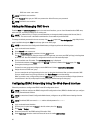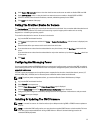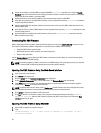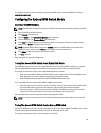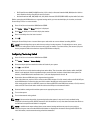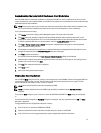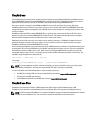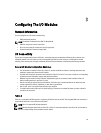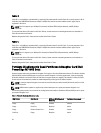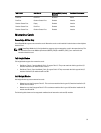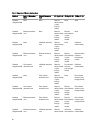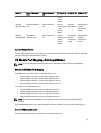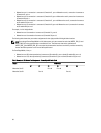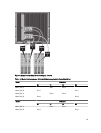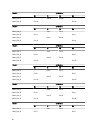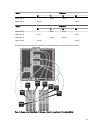
Fabric B
Fabric B is a 1 to 40 Gb/sec redundant fabric, supporting I/O module slots B1 and B2. Fabric B currently supports 1 Gb or
10 Gb Ethernet, DDR/QDR Infiniband, and 4 Gbps or 8 Gbps fibre channel modules. Additional fabric types may be
supported in the future.
NOTE: Fabric B supports up to 16 Gbps fibre channel, Infiniband FDR (14 Gbps standard), and KR (10 Gbps
standard).
To communicate with an I/O module in the Fabric B slots, a blade must have a matching mezzanine card installed in a
Fabric B mezzanine card location.
Modules designed for Fabric A may also be installed in the Fabric B slots.
Fabric C
Fabric C is a 1 to 40 Gb/sec redundant fabric, supporting I/O module slots C1 and C2. Fabric C currently supports 1 Gb or
10 Gb Ethernet, DDR/QDR Infiniband, and 4 Gbps or 8 Gbps fibre channel modules. Additional fabric types may be
supported in the future.
NOTE: Fabric C supports up to 16 Gbps fibre channel, Infiniband FDR (14 Gbps standard), and KR (10 Gbps
standard).
To communicate with an I/O module in the Fabric C slots, a blade must have a matching mezzanine card installed in a
Fabric C mezzanine card location.
Modules designed for Fabric A may also be installed in the Fabric C slots.
Port Auto-Disablement in Quad-Port Network Daughter Card (Dell
PowerEdge M710HD Only)
Systems installed with quad-port Network Daughter Card support a Port Auto-Disablement feature. This feature disables
the third (NIC3) and fourth (NIC4) ports of a quad-port network daughter card during system boot, if the corresponding
I/O module installed in the chassis Fabric A slots does not support quad-port mapping. This behavior is limited to Fabric
A slots only and is automatically enabled or disabled depending on the type of I/O module installed.
NOTE: A quad-port network daughter card must be used with a 48-port switch module (32 internal ports) for all the
ports to be active.
NOTE: LOM firmware updates are applied only to the enabled ports on a quad-port network daughter card.
The following table provides an overview of the configurations that enable or disable the NIC3 and NIC4 ports of a quad-
port network daughter card.
Table 1. Port Auto-Disablement Decision Table
IOM Slot A1 IOM Slot A2 NIC3 and NIC4 (Enabled/
Disabled)
Port Auto-Disablement
Empty Empty Enabled Inactive
Empty Dual Port Disabled Active
Empty Quad or Greater Port Enabled Inactive
Dual Port Empty Disabled Active
34



